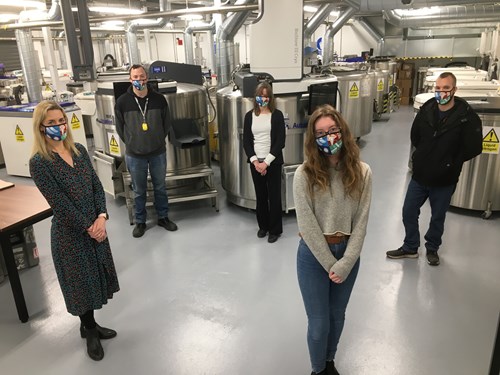Qualifications in The Carriage of Diagnostic & Infectious Substances by Air & Road

Delegates who completed the Carriage of Diagnostic & Infectious Substances by Air & Road course. Left to right: Emma Hobbs, Andrew Robinson, Jane Burton, Ellie Drinkwater, James Mason. Not pictured: Christopher Stanton and Gerard Crees.
The infectious substances supplied by NCPV are classed by the United Nations as “Dangerous Goods”. As such, our products are subject to strict regulations on their transport across the globe. Whether these are moved by road, sea, or air, sending infectious substances requires a detailed understanding on incompatible items, safe packaging, classification, and labelling arrangements.
To make sure the viruses we provide make their way safely to researchers worldwide, staff from NCPV and our cryogenic storage team train in sending infectious substances by air and road. This qualification lasts 24 months, whereupon staff are reassessed. To send infectious substances by air, we recently (re)completed training and assessment on a course compliant with the Civil Aviation Authority (the UK enforcement agency) and the International Civil Aviation Organisation (ICAO, who represent the United Nations). The course observes the legal framework of ICAO by referencing the International Air Transport Association Dangerous Goods Regulations (IATA DGR). To send infectious substances by road, we completed a similar course on the Accord Dangereux Routier (ADR), a regulation to which the UK is a signatory.
These regulations are used internationally to send dangerous goods, whether they are explosives, radioactive, or (in our case) infectious. For example, it is forbidden to carry patient samples on an airplane as a passenger.
A big congratulations to NCPV and the cryogenics team on their qualifications.
Written by Ellie Drinkwater, NCPV Virologist
